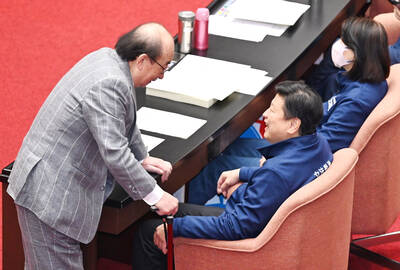VIEW THIS PAGE After being banned in China, Oasis will perform in Taipei on Friday, April 3, sources in the concert-promotion and music industries said.
The concert was originally to be held at Banciao Stadium in Taipei County (台北縣立板橋體育場) but may now be held at the Taipei World Trade Center (TWTC) Nangang Exhibition Hall. Details have not been finalized because the band is still negotiating with promoters, said the sources, who had not received permission to speak with the media.
Information regarding the Taipei concert that was deleted last week from www.ticket.com.tw and a blog run by Sony can be found using Google’s cache function. Oasis’ MySpace page was updated yesterday to include dates in Seoul and Singapore, but not Taipei.
According to a statement on the band’s MySpace page, the Brit-pop supergroup was to play Beijing on April 3 and Shanghai on April 5.
“[R]epresentatives from the Chinese government have revoked the performance licenses already issued for the band and ordered their shows in both Beijing and Shanghai to be immediately canceled,” the statement reads.
“The Chinese authorities’ action in canceling these shows marks a reversal of their decision regarding the band which has left both Oasis and the promoters bewildered.”
Oasis performed at a Free Tibet concert in 1997. Footage on YouTube shows Noel Gallagher singing Wonderwall in front of a Tibetan flag.
Last March, China’s Ministry of Culture said it would tighten regulations on foreign artists after Bjork shouted “Tibet, Tibet!” during a concert in Shanghai. This week marked the 50th anniversary of the failed 1959 Tibetan uprising against Chinese occupation. VIEW THIS PAGE
UPDATE: Tickets for the Oasis concert at the Taipei World Trade Center (TWTC) Nangang Exhibition Hall are now available. Visit www.ticket.com.tw/dm.asp?P1=0000009516 or call (02) 2341-9898 for more information.

On Jan. 17, Beijing announced that it would allow residents of Shanghai and Fujian Province to visit Taiwan. The two sides are still working out the details. President William Lai (賴清德) has been promoting cross-strait tourism, perhaps to soften the People’s Republic of China’s (PRC) attitudes, perhaps as a sop to international and local opinion leaders. Likely the latter, since many observers understand that the twin drivers of cross-strait tourism — the belief that Chinese tourists will bring money into Taiwan, and the belief that tourism will create better relations — are both false. CHINESE TOURISM PIPE DREAM Back in July

Taiwan doesn’t have a lot of railways, but its network has plenty of history. The government-owned entity that last year became the Taiwan Railway Corp (TRC) has been operating trains since 1891. During the 1895-1945 period of Japanese rule, the colonial government made huge investments in rail infrastructure. The northern port city of Keelung was connected to Kaohsiung in the south. New lines appeared in Pingtung, Yilan and the Hualien-Taitung region. Railway enthusiasts exploring Taiwan will find plenty to amuse themselves. Taipei will soon gain its second rail-themed museum. Elsewhere there’s a number of endearing branch lines and rolling-stock collections, some

Could Taiwan’s democracy be at risk? There is a lot of apocalyptic commentary right now suggesting that this is the case, but it is always a conspiracy by the other guys — our side is firmly on the side of protecting democracy and always has been, unlike them! The situation is nowhere near that bleak — yet. The concern is that the power struggle between the opposition Chinese Nationalist Party (KMT) and their now effectively pan-blue allies the Taiwan People’s Party (TPP) and the ruling Democratic Progressive Party (DPP) intensifies to the point where democratic functions start to break down. Both

This was not supposed to be an election year. The local media is billing it as the “2025 great recall era” (2025大罷免時代) or the “2025 great recall wave” (2025大罷免潮), with many now just shortening it to “great recall.” As of this writing the number of campaigns that have submitted the requisite one percent of eligible voters signatures in legislative districts is 51 — 35 targeting Chinese Nationalist Party (KMT) caucus lawmakers and 16 targeting Democratic Progressive Party (DPP) lawmakers. The pan-green side has more as they started earlier. Many recall campaigns are billing themselves as “Winter Bluebirds” after the “Bluebird Action”